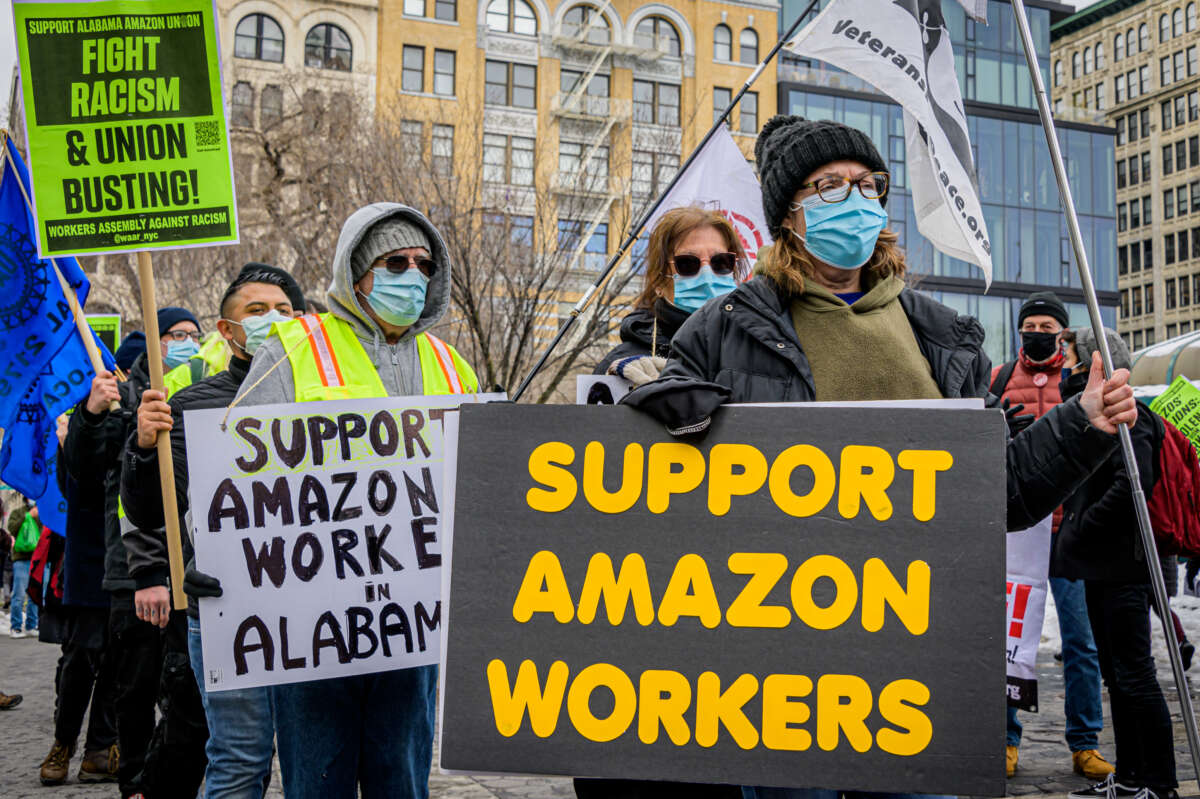Did you know that Truthout is a nonprofit and independently funded by readers like you? If you value what we do, please support our work with a donation.
Amid a recent surge in unionization and other workers’ rights victories, wealthy U.S. corporations have fired union organizers, surveilled employees as they voted on forming a collective bargaining unit, and closed store locations to penalize labor leaders — but a court filing by Amazon on Thursday suggested a new tactic as the e-commerce giant seeks to dismantle the federal agency tasked with protecting employees.
Fighting accusations from prosecutors at the National Labor Relations Board (NLRB) that Amazon illegally retaliated against warehouse workers who unionized, the company submitted a legal filing arguing that the board itself is unconstitutional.
Amazon claimed it did not break the law by limiting workers’ access to the warehouse, which the NLRB said last year was a transparent effort to quash union activity. In its filing, the company also claimed “the structure of the NLRB violates the separation of powers” by “impeding the executive power provided for in Article II of the United States Constitution.”
The company is the third corporation to make such a claim in recent weeks.
In January, a lawyer for grocery chain Trader Joe’s argued in an NLRB hearing over union-busting charges that the board, which was created nearly 90 years ago under the New Deal, is “unconstitutional” — “including but not limited to the structure and organization of the National Labor Relations Board and the agency’s administrative law judges.”
That claim came weeks after astronautics company SpaceX, owned by Tesla CEO Elon Musk — currently the second-richest person on Earth—claimed the NLRB’s enforcement proceedings violate the company’s right to a jury trial.
Amazon echoed that claim on Thursday.
Seth Goldstein, an attorney for Trader Joe’s United, which sued the grocer over illegal retaliation, said last month that the company’s argument suggested that workers “don’t have the right to organize at all.”
“This is really dangerous,” Goldstein toldHuffPost. “Are we really going back to 1920?”
On Thursday, he called Amazon’s decision to launch its own anti-NLRB legal argument “a direct attack on the American labor movement and workers’ rights.”
🚨 Today, Amazon joined Trader Joe’s and Space X in seeking to declare @NLRB and NLRA unconstitutional.
This is a direct attack on the American Labor movement and workers' rights. #UnionStrong, let's fight back against the billionaires trying to destroy us. 💪 #WorkersRights pic.twitter.com/II2g706Nt5
— Seth Goldstein (@SethGoldstein13) February 16, 2024
Amazon’s filing follows more than 250 NLRB complaints against its labor practices in recent years. In 2022, employees at the company’s JFK8 warehouse in Staten Island, New York won what was called a “David versus Goliath” victory, defeating Amazon’s multimillion-dollar anti-union effort by voting to form the Amazon Labor Union (ALU).
“So now capital, unable to hold back labor any longer, is arguing that the NLRB’s very existence is unconstitutional,” said Cornell Law School professor Robert Hockett.
Former New York Times labor reporter Steven Greenhouse pointed out that the new anti-union efforts by Amazon and SpaceX are being led by two of the richest men in the world — Musk and Amazon founder and executive chairman Jeff Bezos.
The world's second-richest man, Jeff Bezos (Amazon), joins the world's richest man, Elon Musk (SpaceX), in pushing to have the NLRB declared unconstitutional — all to weaken American workers' ability to bargain for a fairer deal from these billionaireshttps://t.co/ehNAelTTmj
— Steven Greenhouse (@greenhousenyt) February 16, 2024
“Billionaires,” said Christian Smalls, president of ALU and fired Amazon worker, “they gotta go!”
Corporate interests have previously worked to dismantle regulatory agencies tasked with protecting working Americans, with a trade association representing payday lenders taking its case against the Consumer Financial Protection Bureau to the U.S. Supreme Court last year. The group has argued the CFPB’s funding structure through the Federal Reserve is unconstitutional.
Pawel Popiel, a researcher at the Annenberg School for Communication at the University of Pennsylvania, called Amazon’s filing an “incredibly troubling lobbying effort.”
Press freedom is under attack
As Trump cracks down on political speech, independent media is increasingly necessary.
Truthout produces reporting you won’t see in the mainstream: journalism from the frontlines of global conflict, interviews with grassroots movement leaders, high-quality legal analysis and more.
Our work is possible thanks to reader support. Help Truthout catalyze change and social justice — make a tax-deductible monthly or one-time donation today.
